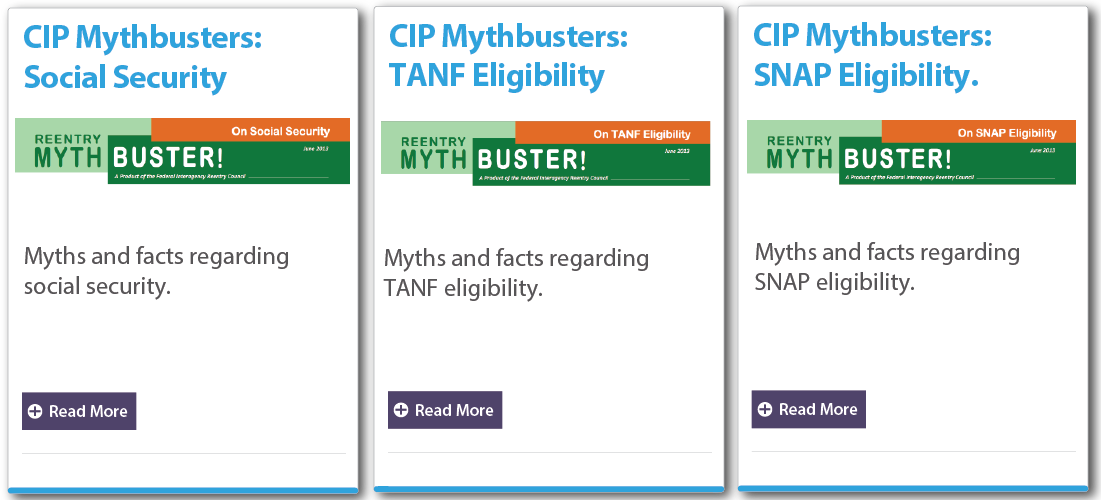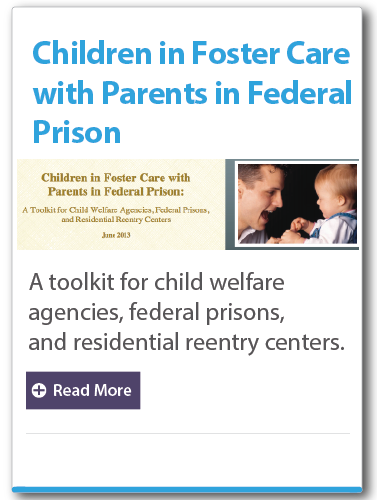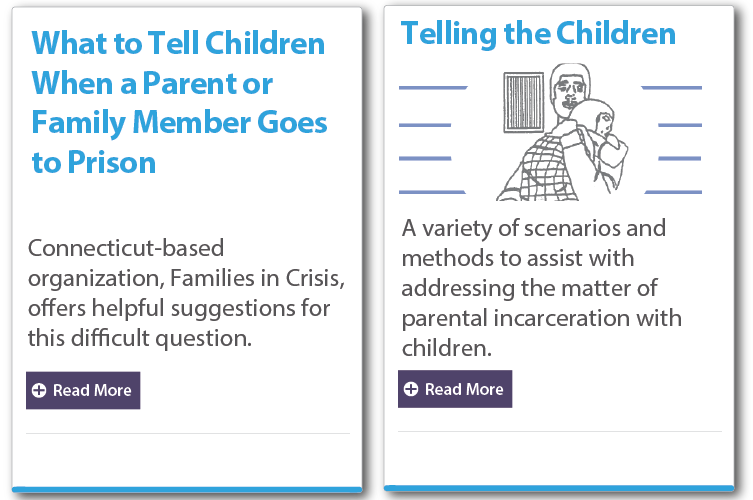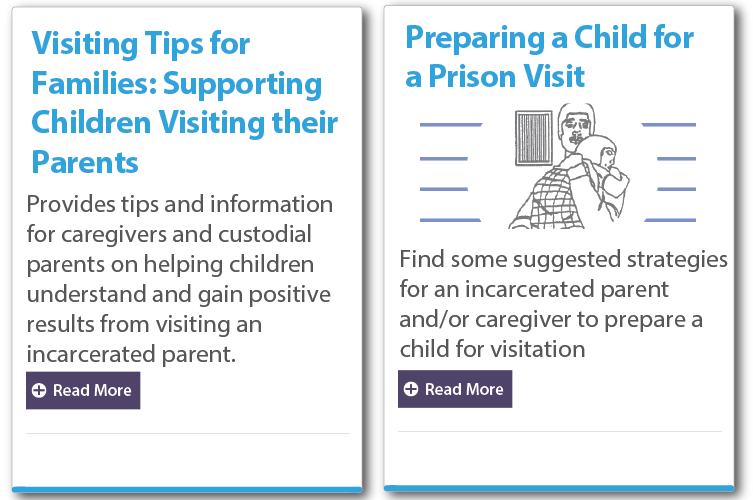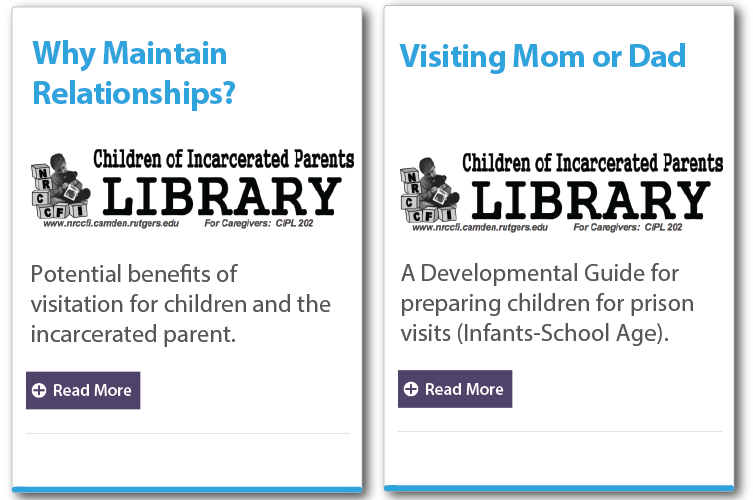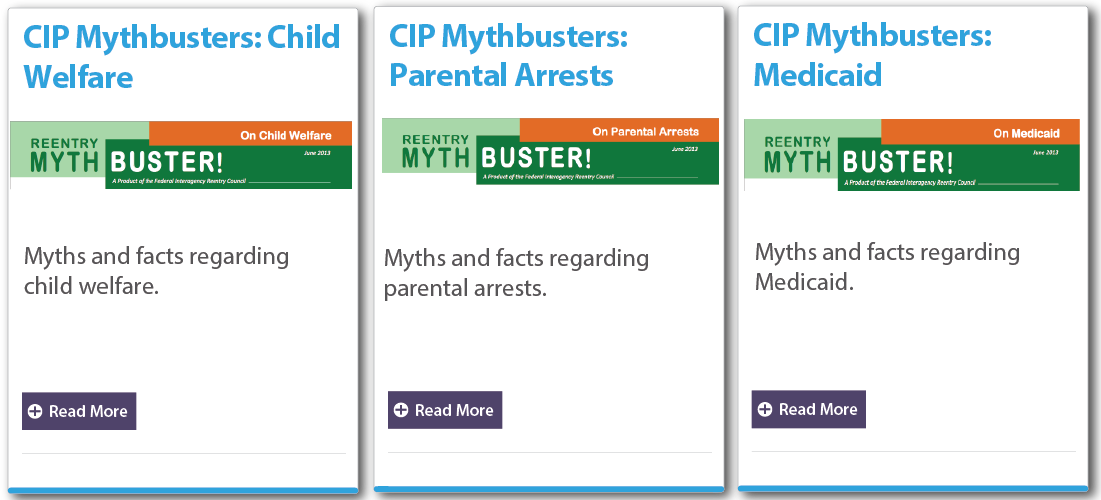
When a parent is separated from their child, their ability to be involved in their child’s life may be limited. However, despite the separation, there are ways in which a parent may continue to support their child. And during a parent’s incarceration, that support may be more important than ever before. Here you will find some frequently asked questions (FAQ) with links to answers that are intended to be helpful for you and your family as you deal with the experience of having a loved one in prison or jail. Many of these questions are shared by other children with incarcerated parents.
Click “Questions About Prison That Children Ask” or “Questions From Children” to find questions and answers relevant to your interest. You can also view the “Resources” section for additional information.

Questions From Children
There are many potential reasons. It may be best for you to ask the adult that you live with. Some parents do not send letters or call because sending letters and making phone calls from prison can be very expensive. Some parents are embarrassed and sad that they are in prison. Some parents are not allowed to send their children letters or call. Some parents do not know that their children want to hear from them. Some parents believe that their children will be happier not hearing from them. If you have moved since your parent was incarcerated, they may not know your new address. However, these are only a few potential reasons and every situation is unique. There may be a different reason as to why your parent is not writing or calling. You may want to ask the adult that you live with why you have not heard from your parent.
Your family member is there because it was decided that they broke the law, or disobeyed a rule, and going to prison is part of their consequence.
If you do something wrong you might have a consequence like a time-out or not riding your bike for three days.
Your family member has food and water, a place to sleep and comfortable clothes. As part of their consequence, they need to stay at the jail/prison/correctional facility for some time. While there, they will eat, sleep and talk with other people. If you write to, or speak with your family member, you may want to ask them what they do while they are there and what their room is like.
All feelings are normal. Sometimes it helps to talk to other people like a friend or trusted adult about your feelings. You could also write or draw pictures about how you feel.
Yes, it is okay that you love your family member.
Yes it is, and it is also okay for you to have different feelings about this later.
Everyone in the family needs love and support. You can help by doing chores at home, being a good brother or sister, doing well in school and making your family proud. And if you have bad days than that is okay, just remember to keep trying.
The people who work at the jail/prison work very hard to keep everyone safe.
You should talk to your parent or caregiver and figure out what to say together. If you do not want to do this you can also speak with teachers, counselors and other trusted adults.
If children act out towards you because they do not understand your situation you can talk with an adult that you trust. If there is not an adult at school that you are comfortable talking to, you can talk to an adult at home or an adult that you are most comfortable with about what is happening at school.
Your friend is very lucky that you are concerned. Your friend may be sad, angry, or even deny that their parent is in prison so try not to force them to talk about it. Instead, allow them to speak about what they want to. If you do talk about it, make sure you are in an area where no one else can hear you because your friend may be comfortable talking to you about their parent but not want others to hear. Do your best to listen to your friend. You are doing the right thing by trying to help. If your friend has a bad reaction when talking about it, it is probably because they are hurt, not mad at you. While it may be difficult for you, know that what you are doing is helping your friend.
Here are some tips if your friend’s parent is in prison:
- Do not force them to talk about anything. Instead allow them to speak about what they want.
- Make sure you are in an area where no one else is going to hear you.
- Do your best to listen to your friend.
- Do not hesitate to ask for help. If you feel like your friend is really upset or that you need help, you can go to a trusted adult and explain to them what is going on.
- Think about some things you might say before talking with your friend.
- Before your conversation with your friend think of some comforting things you want to tell them. You can also tell them where they can find other answers, like this website.
Questions About Prison That Children May Ask
In Connecticut, prison is a place where some arrested and convicted people stay if staying at prison is part of their consequence for breaking the law, or a rule. If you have a parent in prison you are not alone. 1 in 14 children in this country has had a parent in prison. Many of these children are having the same worries, fear and other feelings that you have.
Some people go to jail, or prison, when they are arrested for breaking the law.
Talk to the adult you live with and tell them you would like to know.
Usually it does not.
This is something you could ask the adult you live with. It is different for every person in prison.
People in prison wear identical uniforms that look like pajamas or the clothes painters wear. They also have socks, shoes, and jackets.
You cannot bring your friend to visit but you can send your parent a photo of you and your friend and tell your parent about your friend and what you like to do together.
When you visit your parent you may have to wait for a while. Make sure you follow all the rules you are given (like what you can wear and what you can and cannot bring in with you) so that you can see your parent.
You must be at least 18 years old to go on your own. If you are not 18, then you need to have an adult who is on the visitor’s list with you. If you are unsure as to who to go with ask the adult you live with. If you are 16 years old or younger you will need to have two forms of ID to see your parent. Talk about this with the adult you live with.
Every prison is different. Check the visiting schedule for the prison your loved one is in. The schedule may be confusing so ask your family member or caregiver for help.
Only if your parent is allowed to have a “contact visit”. If they are allowed to have contact visits then at the beginning and end of the visit you can briefly hug and kiss. During the visit you will sit across from each other at a table and cannot touch until saying good-bye. If you are not sure if you are able to touch, ask your parent if it is okay.
If your parent is allowed “non-contact visits” then you will get to see them through a glass partition, like a window, and talk using a telephone. You will not get to touch them. Sometimes the rules change, as to whether a parent can have contact or non-contact visits. Either way, you will get to see and speak with your parent.
You cannot bring anything with you into the prison, but you can tell your parent about it. You might also be able to take a picture of it and send it to them with a letter. Ask the adult you live with about it.
Resources
Talking to Kids
Visiting
Child Welfare
